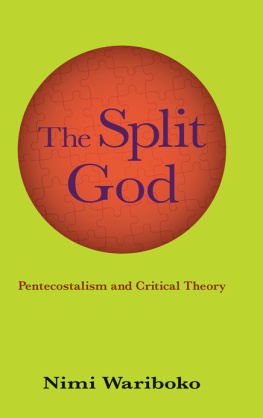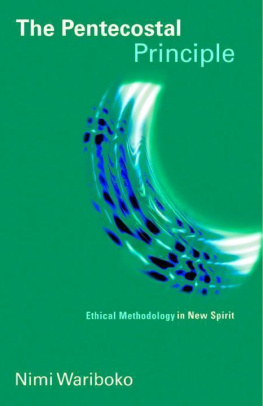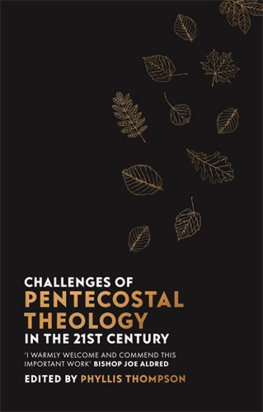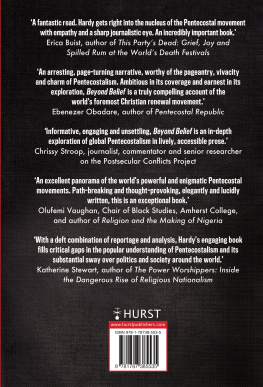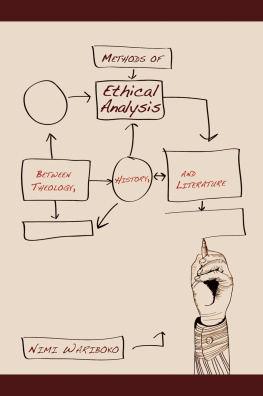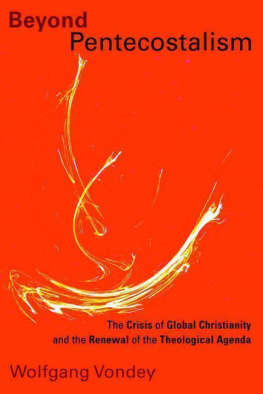The Split God
SUNY series in Theology and Continental Thought
Douglas L. Donkel, editor
The Split God
Pentecostalism and Critical Theory
Nimi Wariboko
An earlier version of chapter 7 was published as West African Pentecostalism: A Survey of Everyday Theology, in Global Renewal Christianity: Spirit-Empowered MovementsPast, Present and Future, Volume 3: Africa by Vinson Synan, Amos Yong, and J. Kwabena Asamoah-Gyadu (Lake Mary, FL: Charisma House, 2016): 118. Used by permission.
Published by State University of New York Press, Albany
2018 State University of New York
All rights reserved
Printed in the United States of America
No part of this book may be used or reproduced in any manner whatsoever without written permission. No part of this book may be stored in a retrieval system or transmitted in any form or by any means including electronic, electrostatic, magnetic tape, mechanical, photocopying, recording, or otherwise without the prior permission in writing of the publisher.
For information, contact State University of New York Press, Albany, NY
www.sunypress.edu
Library of Congress Cataloging-in-Publication Data
Wariboko, Nimi, author.
Title: The Split God: Pentacostalism and critical theory / Nimi Wariboko, author
Description: Albany: State University of New York Press [2018]
Series: A volume in the SUNY series in Theology and Continental Thought.
Identifiers: ISBN 9781438470191 (hardcover : alk. paper) | ISBN 9781438470214 (ebook)
Further information is available from the Library of Congress.
10 9 8 7 6 5 4 3 2 1
To Mark Lewis Taylor
Contents
Acknowledgments
Authors write acknowledgments to publicly record their indebtedness to the living and the dead who helped them in the process of researching and writing their books. I have done a lot of this in my previous sixteen monographs and four edited volumes. Now that I am on my seventeenth monograph, it occurred to me that my acknowledgment should properly focus on the not-yet born. I expect their coming onto the academic scene, to carry forward the ideas in this book. I acknowledge their accomplishments of this task and the claim past scholarship has on them.
This approach to acknowledgment is very important for those of us who are Africans and/or Pentecostals. We write not only with an eye on the current intellectual questions and debates, but also with an ear on the distant sound of the footsteps of coming generations. We are building a body of work for the next generations, whose coming is expected and whose joy in inheriting and encountering works and ideas left for them by their own deeply excites me. I acknowledge here the inspiration I received from the generations of Africans and Pentecostals who are coming after me. I acknowledge the intellectual powers of those who come after me, the straps of whose sandals I am not worthy to untie. I have no greater joy than to expect that my brothers and sisters, my children, will be committed to the quest for truth rooted in the public intercourse of rigorous ideas.
Now let me turn to the past and present generations who assisted me in bringing the idea of this book to fruition. I salute Catherine Keller of Drew University, who read a draft of . Erica, thanks for your enthusiastic support of my scholarship. The editors and staff of the State University of New York Press, Christopher Ahn, Chelsea Miller, Diane Ganeles, and Dana Foote did great service to the cause of publishing this book, a service that models what good editors should be. I also wish to thank Douglas L. Donkel, editor of the SUNY series in Theology and Continental Thought, for his support. Thanks to Ms. Itohan Mercy Idumwonyi of Rice University for finding time to prepare the index amid writing her dissertation.
I also acknowledge all my teachers, past and present, in formal and informal settings, who helped to form and inspire me to work at the uncomfortable intersectionality of disciplines. I am a scholar on the boundary. I work on the boundaries of economics and ethics, economics and religion, economics and philosophy, ethics and theology, philosophy and theology, social history and ethics, social sciences and theology, and present and not-yet-present knowledges. My thinking always functions at an interstitial site, wrestling in a contact zone of disciplines that is neither/nor. This is a site that opposes binary opposition, oscillating between spheres of knowledge. It is the fragile, fleeting, and slippery para-site of erotic, new, refreshing insights and lights. I am talking of the uncanny non-place that promises to birth the underivably new in history. My soul finds deep peace at this frontier, the edge of knowledge that is always approaching and withdrawing approach. This book reflects this orientation of my scholarship. And I thank you, the reader, for your forbearance in walking and working with me in this unhomely space.
Preface
This book exclusively appropriates critical theory as a lens to interpret Pentecostalism. It examines the construction of the notion of God among Pentecostals and brings it into conversation with a postmodern philosophy of religion, particularly the Marxist/psychoanalytic thread of critical theory rather than the existentialist or hermeneutic phenomenological one. Pentecostalism is one of the fastest-growing religious movements in the world (especially in the global south) and its conception of God, its ideas about ontology, epistemology, the sacred, human embodiment of the divine, and numerous other matters offer rich resources for deep philosophical reflection. Continental philosophy offers us varied and rich concepts, tools, and interpretative lenses for studying Pentecostalism as a social movement, religious tradition, and historical reality, and to aid in such reflection. In particular, the ideas of Slavoj iek, Jacques Lacan, Jean-Luc Nancy, and Giorgio Agamben, for instance, are significant sites in which to engage pentecostal thoughts and ideas to make connections between Pentecostalism and postmodern philosophy of religion. Besides, critical theorists like iek have engaged the theology and radical orthodoxy of John Milbank. Nancy has applied his deconstructive philosophy of religion to Christianity. Alain Badiou has engaged the figure of Saint Paul as militant revolutionary. Agamben has brought his formidable analytical skills to bear on Pauls Letter to the Romans and given us a fresh understanding of messianism. How might the insights, critical perspectives, and philosophies of these scholars help us to undertake a critical religious study of Pentecostalism? While this book will engage the philosophers mentioned here and many more, it is germane to add that our discourse enters into postmodern religious theory through the specific conversational thread of iekian critical religious theory (an alternative tradition in continental philosophy). He is a prominent player in the contemporary debates and his theory has become influential in postmodern religious theory. In spite of all these, the book does not make claim to be a work of philosophy per seit is only a work in critical religious studies with a focus on Pentecostalism. Its aim is to bring to pentecostal studies the rich resources and critical tradition of continental philosophy of religion.
The data and issues that form the basis of our engagement with critical theory come from everyday practices of Pentecostals rather than from academic theologies and doctrines of God. The data and issues of our arguments are organized around the grassroots-derived notion of the split God. By this I mean that Pentecostals have opened up the traditional notion of God into new possible uses. The art and act of splitting deactivates the traditional (inherited) notion of God and radicalizes it. By splitting, the inherited notion is not only separated from its orthodox grounding without abandoning orthodoxy, but also parts and attributes of God are separated from Godself and are recombined and exhibited in their separation from Godself, becoming spectacles. Pentecostals hold that this split God is forever interacting with a reality that is an internally inconsistent and incomplete whole. We want to grasp Pentecostals splitting of the world and of God as they grapple to understand human existence spiritually. The book studies this epistemic orientation philosophically and critically, demonstrating how it structures and organizes everyday practices and how everyday practices in turn help Pentecostals to construct a practical, handy notion of God. The book then offers an intellectual reflection connecting pentecostal practices on the ground with continental philosophies in order to deconstruct the pentecostal philosophy of God.

